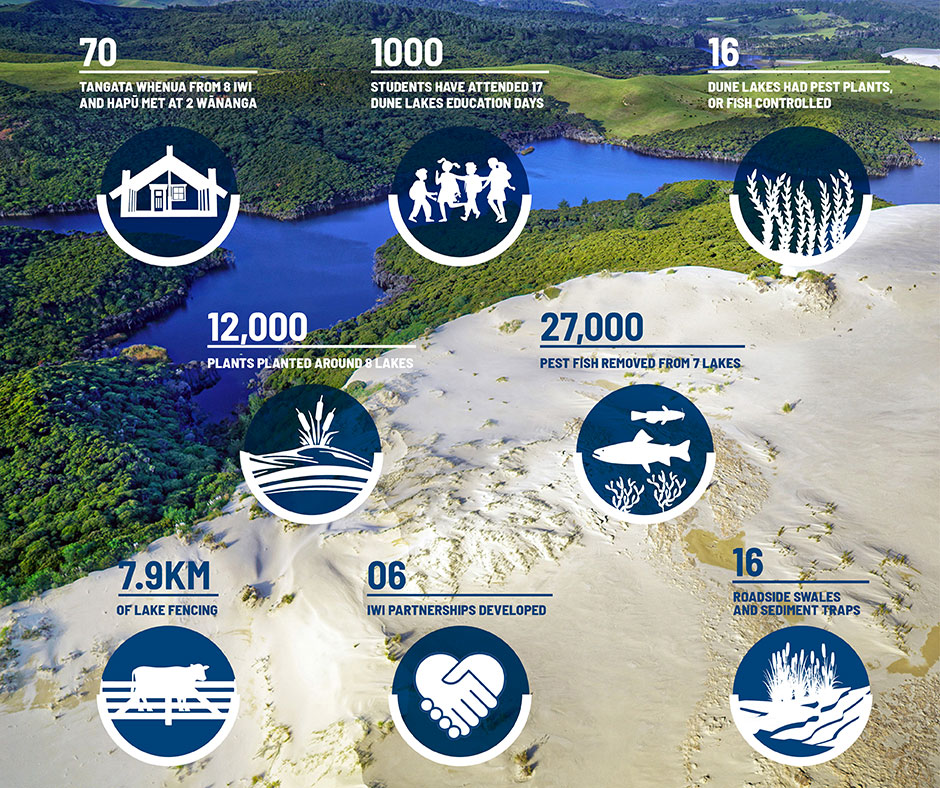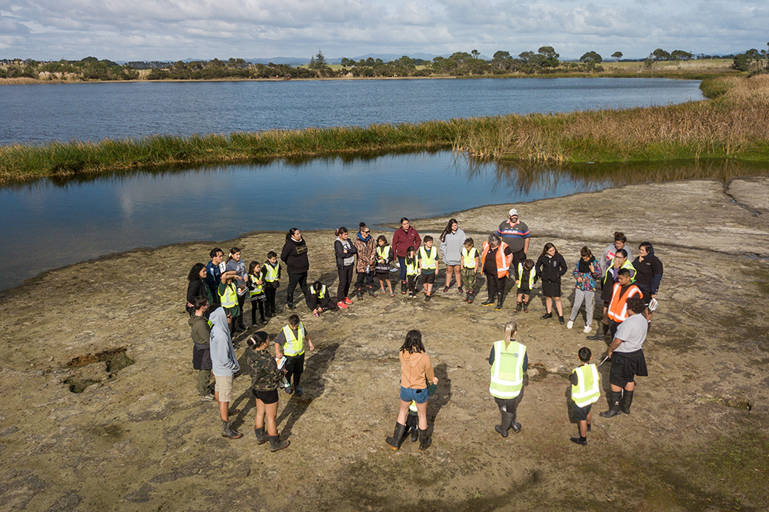Freshwater Improvement Fund Dune Lakes Project Results
In the last five years, 29,000 pest fish have been removed at seven dune lakes, the water weed lagarosiphon has not been seen in Lake Ngatu since 2020 and 1,000 tamariki have attended dune lake education days, all because of the Freshwater Improvement Fund Dune Lake Project and the contributions towards it from thousands of people across the rohe. We thank you all, for all your mahi.
In 2018 The Ministry for the Environment’s Freshwater Improvement Fund (FIF) committed $100 million over 10 years to improve the management of New Zealand’s lakes, rivers, streams, groundwater, and wetlands. As part of the FIF, the Northland Regional Council received matched funding to improve the water quality of some of Northland’s dune lakes. The total project value was $1,565,950 over five years and the project ran from March 2018 to March 2023.
The goals of the project were to improve the water quality and ecology of several of Northland’s dune lakes, whilst increasing understanding in the community of their unique value, their vulnerability and how best to care for them now and into the future.
The project was delivered through a series of workstreams. These focused on the threats to the lakes from pest plants and animals, improving land management and agricultural practices and reducing sediment and unwanted nutrient flow into lakes. Concurrent workstreams focused on community engagement, education and kaitiakitanga.
Workstreams:
- Eradicating water-weeds
- Controlling pest fish
- Removing grass carp
- Stock exclusion through fencing and reticulation
- Reducing nutrient and sediment inputs
- Education about dune lakes for school students and local communities
- Collaborating with tangata whenua and other partners
Over the five years, staff from across NRCs biodiversity, biosecurity, Enviroschools and community engagement teams have worked on the project, in partnership with iwi, hapū, schools, landowners and local communities.

The project has concluded with a range of successful outcomes that are already contributing to the improved health of Northland’s dune lakes.
Excellent results have occurred in the removal of pest plants and fish, with a total of 16 lakes recording reductions and controls.
Nearly 8km (7,993m) of fencing has been erected to exclude stock from lakes.
Two water reticulation systems have been installed at Lakes Shag and Midgley and over 12,000 wetland plants have been planted around eight lakes.
Water quality is being improved following the installation of sediment traps to capture sediment and unwanted nutrients, with three roadside swales, eight sediment traps and an area of wetland planting around Lake Ngatu and Rotokawau having been completed.
The important project strand of fostering a greater understanding within the local and wider Northland community of the value of dune lakes has also seen good success. Engagement work that has flourished over the course of the project continues. Two wānanga have been held with iwi partners. At Waiora Marae a successful Wānanga Taiao was held over the course of three days in April 2021 and over 40 tangata whenua from eight iwi and hapū met for three days at Kai Iwi Lakes in May 2022. Hui are being held with six iwi in 2023 to discuss future work plans for each rohe.
Another outstanding success has been the 1,000 tamariki from Northland schools that have attended 17 dune lake education days over the course of the five years. These education events were held in partnership with Enviroschools and Te Aho Tu Roa. Students now have a better understanding of the value of dune lakes and how we can help preserve them, as well as an appreciation of lake biodiversity.
However, ongoing challenges remain for these fragile ecosystems. Water quality is poor in many lakes and new weeds continue to arrive. Work needs to continue to ensure the survival of dune lakes and their biodiversity - and to encourage us all to be guardians of their future. We all have a part to play, by using our lakes responsibly when we’re out on the boat or swimming, by using good land management practices and by cherishing these internationally important ecosystems.
 Planting Lake Waiporohita 2019
Planting Lake Waiporohita 2019
 Getting the mahi done Lake Waiporohita 2019
Getting the mahi done Lake Waiporohita 2019
 Waiporohita plantings from the dune lake education day in 2019
Waiporohita plantings from the dune lake education day in 2019
 Education at Lake Waiporohita
Education at Lake Waiporohita
 Learning by the lake
Learning by the lake
 Checking the water quality dune lakes education at Lake Ngatu
Checking the water quality dune lakes education at Lake Ngatu
 Dune lakes education Lake Ngatu
Dune lakes education Lake Ngatu
 Common bully
Common bully
 Netting tuna at Lake Ngatu
Netting tuna at Lake Ngatu
 Tuna in a net Lake Ngatu
Tuna in a net Lake Ngatu
 Netting pest fish
Netting pest fish
 Pest pish success
Pest pish success

